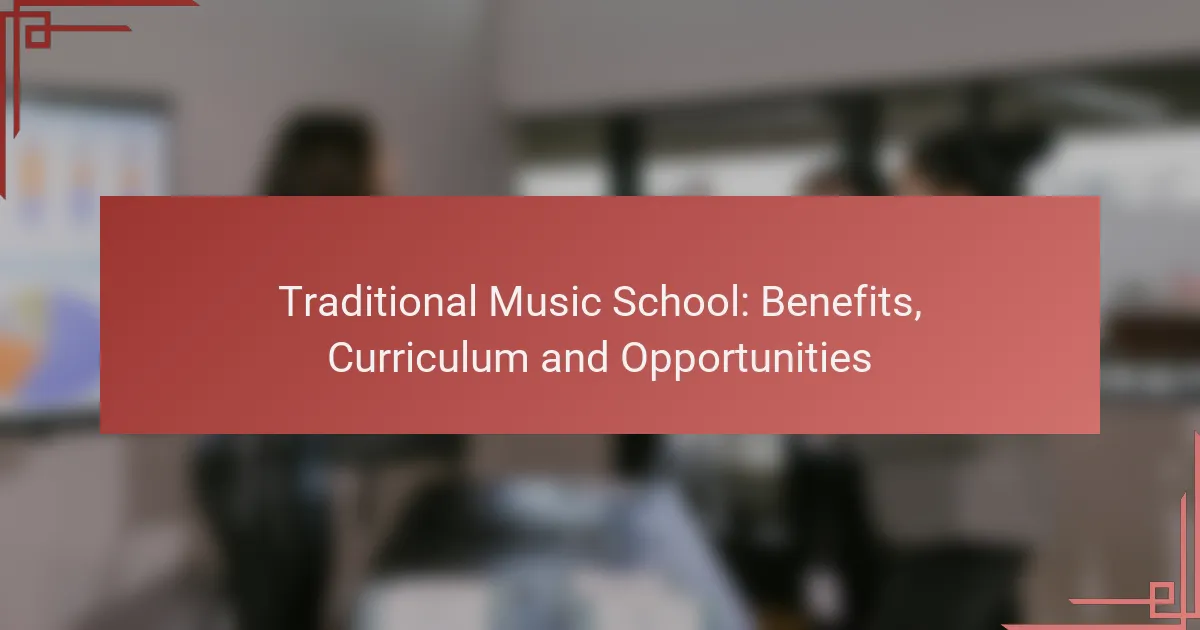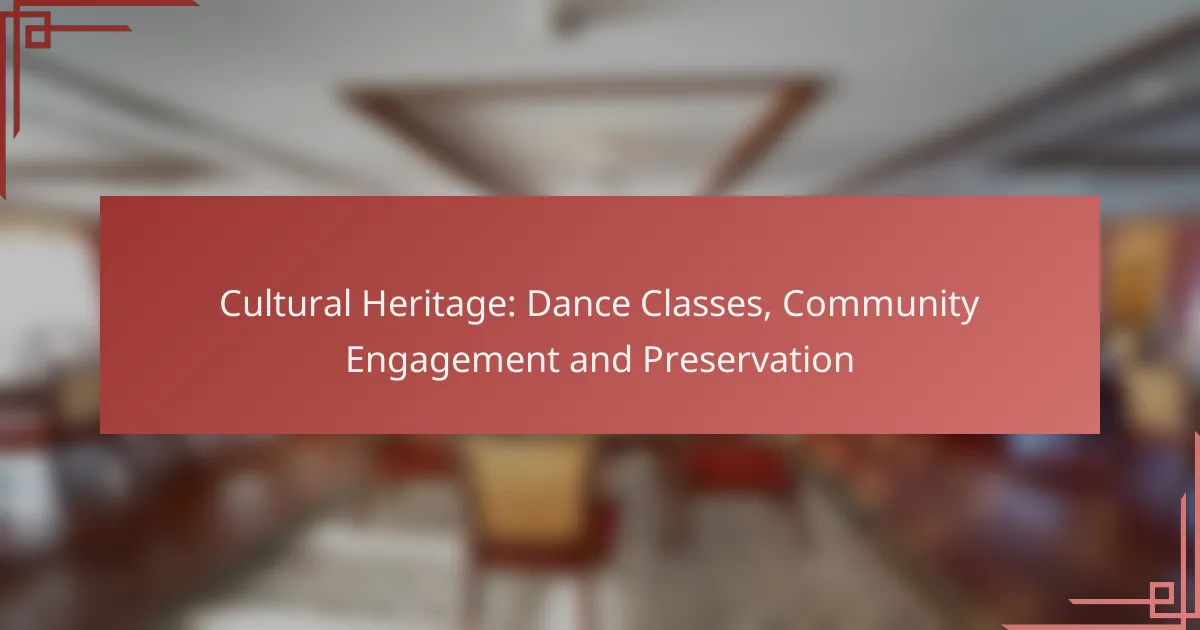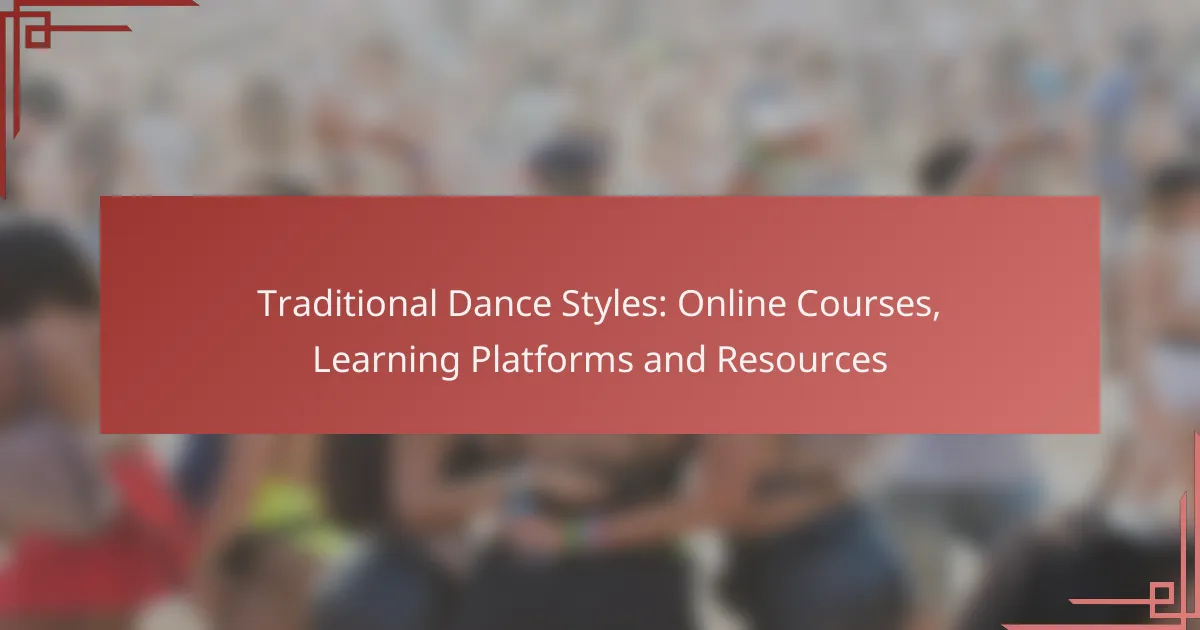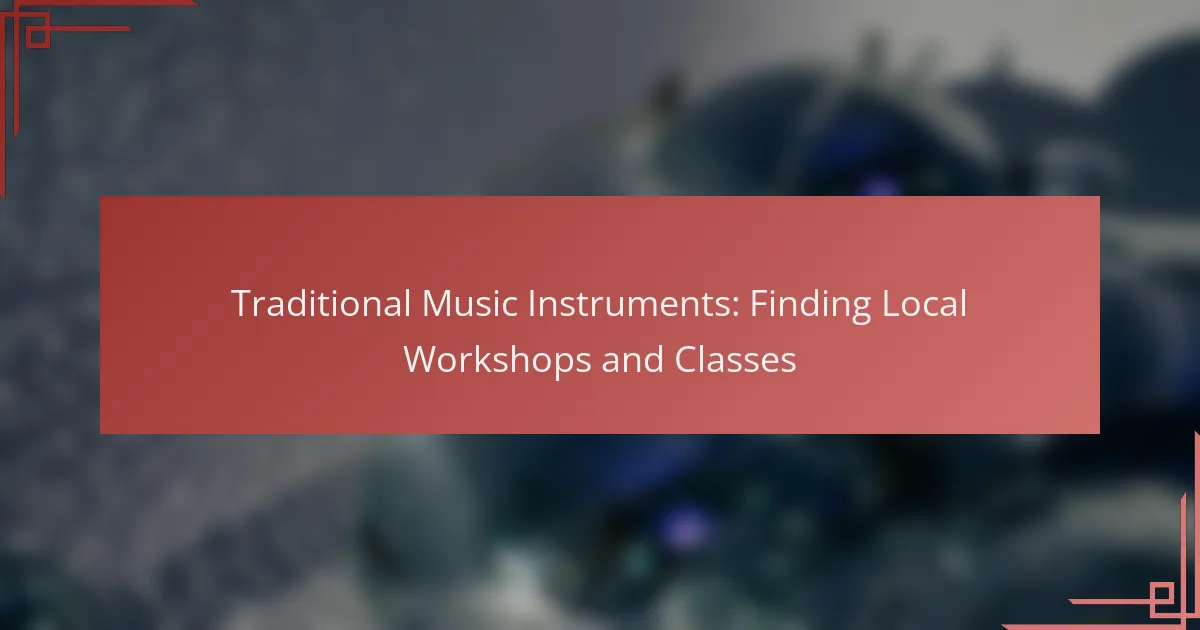Attending a traditional music school provides a structured learning environment, access to experienced instructors, and valuable networking opportunities that can greatly enhance a student’s musical journey. The comprehensive curriculum covers essential subjects such as music theory, instrument training, and ensemble performance, fostering well-rounded musicianship. Additionally, students benefit from various opportunities like internships and masterclasses, immersing them in the vibrant music scene and improving their career prospects.
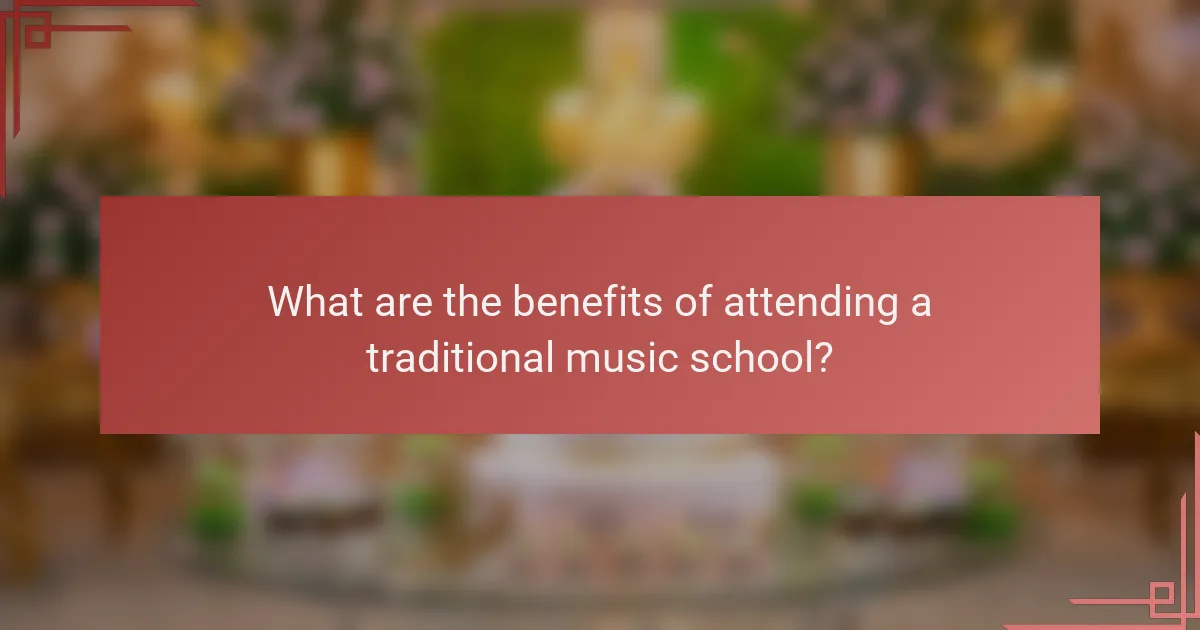
What are the benefits of attending a traditional music school?
Attending a traditional music school offers numerous advantages, including a structured environment for learning, access to skilled instructors, and valuable networking opportunities. These benefits can significantly enhance a student’s musical journey and career prospects.
Structured learning environment
A structured learning environment in a traditional music school allows students to follow a well-defined curriculum that builds skills progressively. This organization helps students stay focused and motivated, as they can see their improvement over time.
Classes are typically scheduled regularly, providing a routine that encourages consistent practice and discipline. This structure is particularly beneficial for beginners who may struggle with self-directed learning.
Access to experienced instructors
Traditional music schools often employ instructors with extensive experience and expertise in their respective fields. These professionals can offer personalized feedback and guidance, which is crucial for developing technical skills and artistic expression.
Students benefit from learning various techniques and styles directly from those who have mastered them, which can accelerate their growth as musicians. Instructors can also share insights about the music industry, helping students navigate their future careers.
Networking opportunities
Networking is a key benefit of attending a traditional music school, as students connect with peers, instructors, and industry professionals. These relationships can lead to collaborations, mentorships, and job opportunities in the music field.
Participating in school events, concerts, and workshops allows students to build a professional network that can be invaluable when seeking gigs or further education. Engaging with fellow musicians fosters a sense of community and support.
Performance experience
Performance experience is integral to a traditional music school curriculum, providing students with opportunities to showcase their skills in front of an audience. Regular performances help build confidence and stage presence, essential traits for any musician.
Many schools organize recitals, competitions, and ensemble performances, allowing students to gain practical experience in various settings. This exposure can also help students learn how to handle performance anxiety and improve their overall musicianship.
Comprehensive curriculum
A comprehensive curriculum in traditional music schools covers a wide range of topics, including music theory, history, and various instruments or vocal techniques. This breadth of knowledge equips students with a solid foundation to understand and appreciate music deeply.
Students often have the flexibility to choose electives that align with their interests, whether in classical, jazz, or contemporary styles. This tailored approach ensures that they receive a well-rounded education that prepares them for diverse musical paths.
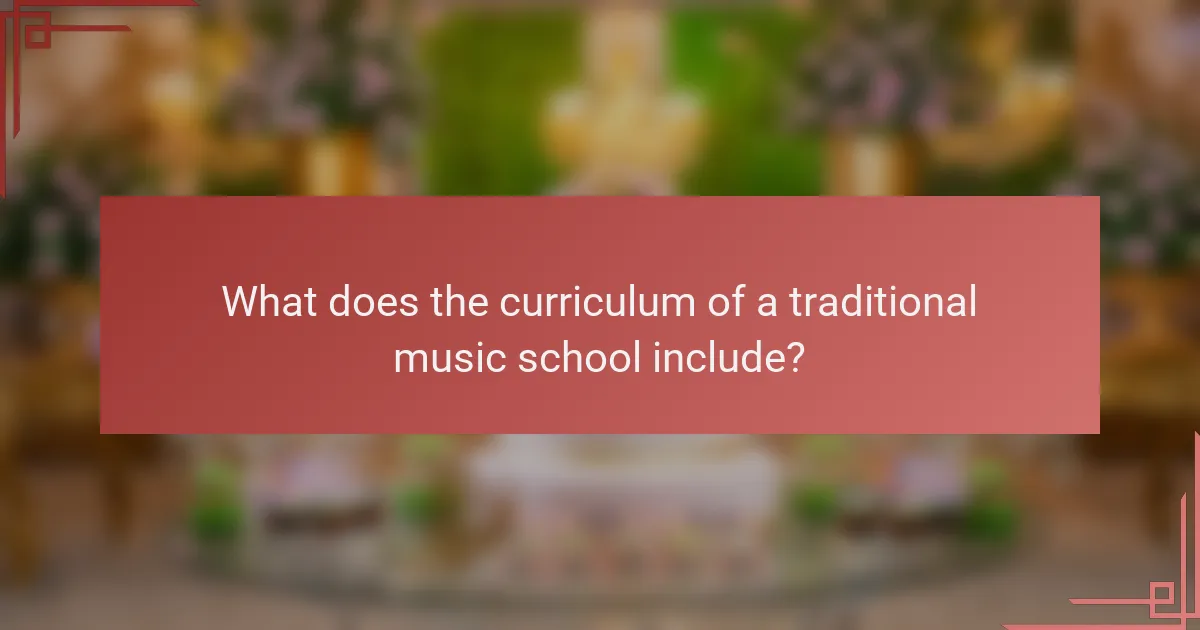
What does the curriculum of a traditional music school include?
The curriculum of a traditional music school typically encompasses a variety of subjects designed to develop a comprehensive understanding of music. Students engage in music theory, instrument training, vocal techniques, music history, and ensemble performance, each contributing to their overall musicianship.
Music theory and composition
Music theory forms the foundation of a musician’s education, covering essential concepts such as scales, chords, and harmony. Students learn to read and write music, analyze compositions, and understand the structure of different musical styles.
Composition courses encourage creativity, allowing students to create original works. They often explore various genres and techniques, fostering a personal style while adhering to theoretical principles.
Instrument training
Instrument training is a core component, where students receive hands-on instruction on their chosen instruments, such as piano, guitar, or violin. Lessons typically focus on technique, repertoire, and performance skills.
Students may participate in individual lessons and group classes, which help develop both personal proficiency and collaborative skills. Regular practice and performance opportunities are crucial for mastery.
Vocal techniques
Vocal techniques training emphasizes breath control, pitch accuracy, and vocal health. Students learn various singing styles, including classical, jazz, and contemporary, to enhance their versatility.
Workshops and masterclasses with experienced vocalists provide practical insights and feedback, helping students refine their skills and gain confidence in their performance abilities.
Music history
Music history courses offer insights into the evolution of music across different cultures and time periods. Students study influential composers, significant movements, and the social contexts that shaped musical developments.
Understanding music history enriches a musician’s perspective and informs their practice, enabling them to draw inspiration from a wide array of musical traditions.
Ensemble performance
Ensemble performance is vital for developing teamwork and collaboration skills among musicians. Students participate in various group settings, such as orchestras, bands, or choirs, where they learn to listen and adapt to other musicians.
These experiences not only enhance performance skills but also prepare students for real-world musical engagements, fostering a sense of community and shared artistic expression.

What opportunities do traditional music schools provide in major cities?
Traditional music schools in major cities offer a variety of opportunities that enhance students’ learning experiences and career prospects. These include internships, masterclasses, and collaborations with local music festivals, all designed to immerse students in the vibrant music scene.
Internships with local orchestras
Internships with local orchestras provide students with hands-on experience in a professional setting. These opportunities often allow students to observe rehearsals, assist with administrative tasks, and even perform in smaller ensembles.
Students should seek internships that align with their musical interests and career goals. Many orchestras in major cities offer paid internships, which can help offset living expenses while gaining valuable experience.
Masterclasses with renowned musicians
Masterclasses featuring renowned musicians are a cornerstone of traditional music education. These sessions allow students to receive personalized feedback and insights from accomplished artists, enhancing their technical skills and artistic expression.
Participating in masterclasses can be competitive, so students should prepare thoroughly and demonstrate their commitment. Many prestigious musicians offer these classes in major cities, often at music schools or cultural institutions.
Collaboration with music festivals
Collaboration with music festivals provides students with unique performance opportunities and exposure to diverse audiences. Many festivals seek young talent to perform alongside established artists, creating a platform for emerging musicians.
Students should actively engage with local festivals, as these collaborations can lead to networking opportunities and potential career advancements. Researching festival schedules and application processes is essential for those looking to participate.
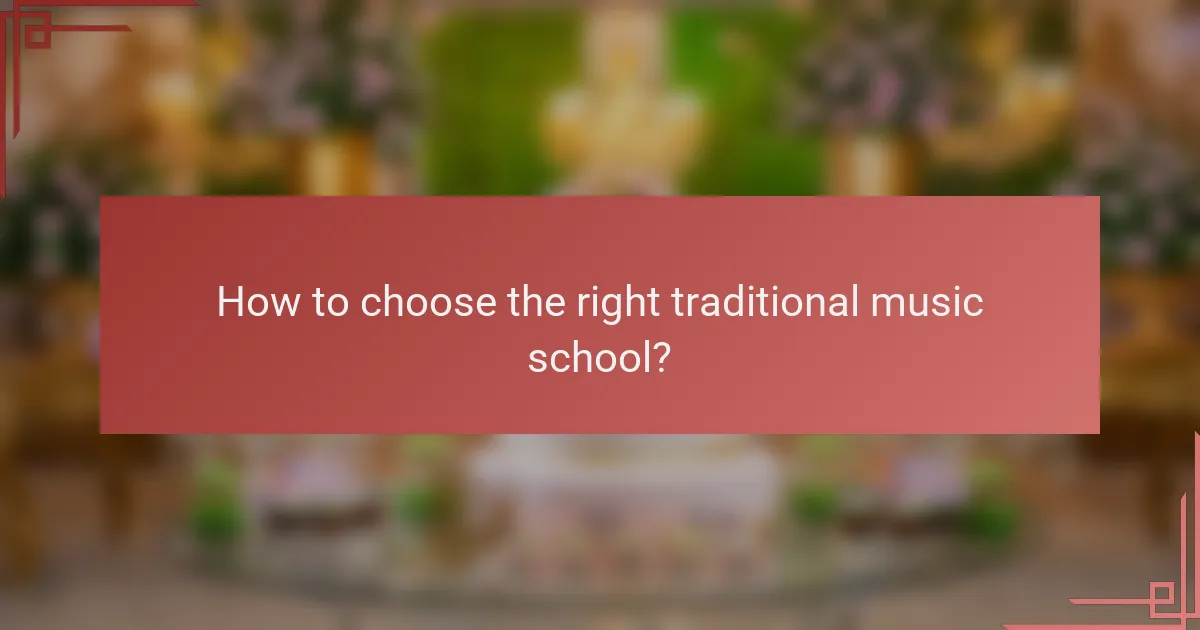
How to choose the right traditional music school?
Choosing the right traditional music school involves evaluating factors such as accreditation, location, and available specializations. Prioritize schools with a strong reputation and facilities that support your musical interests and goals.
Accreditation and reputation
Accreditation ensures that a music school meets specific educational standards, which can affect the quality of instruction and recognition in the industry. Look for schools accredited by recognized bodies, as this can enhance your credentials when seeking employment or further education.
Research the school’s reputation by reading reviews, talking to alumni, and checking their success rates in placing graduates in relevant fields. A school with a strong reputation often has experienced faculty and a network of industry connections that can benefit students.
Location and facilities
The location of a traditional music school can significantly impact your learning experience. Consider schools situated in culturally rich areas where you can immerse yourself in music, attend performances, and engage with local musicians.
Evaluate the facilities available at the school, such as practice rooms, performance spaces, and access to instruments. Well-equipped facilities can enhance your learning and provide opportunities for collaboration with other students.
Specializations offered
Different traditional music schools may offer various specializations, such as folk, classical, or world music. Identify your interests and look for schools that provide tailored programs or courses in those areas.
Consider the faculty’s expertise in your desired specialization, as experienced instructors can offer valuable insights and mentorship. Additionally, check if the school provides opportunities for performance, workshops, or collaborations that align with your musical goals.
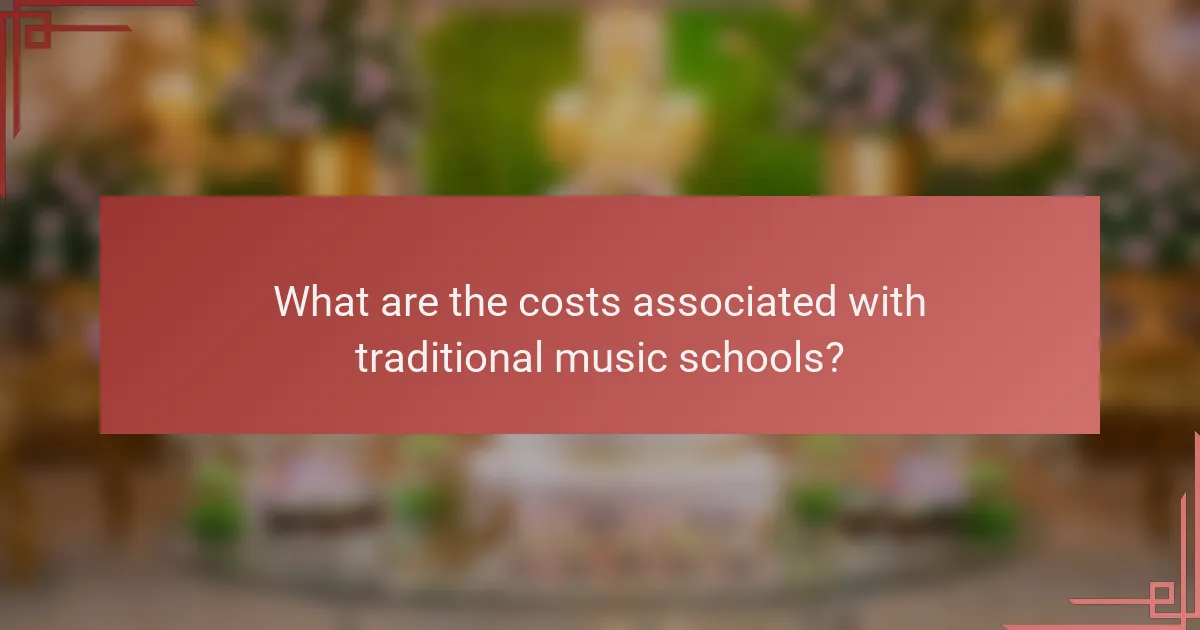
What are the costs associated with traditional music schools?
The costs of traditional music schools can vary significantly based on factors such as location, program length, and facilities. Generally, students can expect to pay tuition fees ranging from a few thousand to over ten thousand dollars per year, not including additional expenses like instruments, materials, and living costs.
Tuition Fees
Tuition fees at traditional music schools typically range from around $5,000 to $30,000 per year. Renowned institutions in major cities may charge higher rates, while community colleges or local programs might offer more affordable options. It’s essential to research various schools to find a program that fits your budget.
Additional Costs
In addition to tuition, students should consider costs for instruments, sheet music, and other materials, which can add hundreds to thousands of dollars to the overall expense. Some schools may require students to purchase specific instruments, while others might provide access to school-owned equipment. Living expenses, including housing and food, should also be factored in, especially for those attending schools away from home.
Financial Aid and Scholarships
Many traditional music schools offer financial aid packages and scholarships to help offset costs. Students should explore options such as federal student loans, grants, and merit-based scholarships. Applying early and thoroughly can increase the chances of receiving financial assistance, making music education more accessible.
